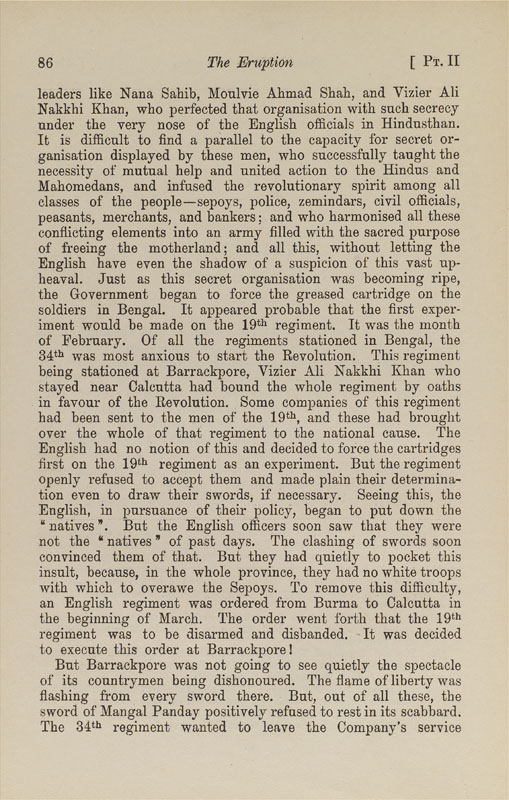86
The Eruption
[ Pt. II
leaders like Nana Sahib, Moulvie Ahmad Shah, and Vizier Ali
Nakkhi Khan, who perfected that organisation with such secrecy
under the very nose of the English officials in Hindusthan.
It is difficult to find a parallel to the capacity for secret or¬
ganisation displayed by these men, who successfully taught the
necessity of mutual help and united action to the Hindus and
Mahomedans, and infused the revolutionary spirit among all
classes of the people—sepoys, police, zemindars, civil officials,
peasants, merchants, and bankers; and who harmonised all these
conflicting elements into an army filled with the sacred purpose
of freeing the motherland; and all this, without letting the
English have even the shadow of a suspicion of this vast up¬
heaval. Just as this secret organisation was becoming ripe,
the Government began to force the greased cartridge on the
soldiers in Bengal. It appeared probable that the first exper¬
iment would be made on the 19*^ regiment. It was the month
of February. Of all the regiments stationed in Bengal, the
34*^ was most anxious to start the Revolution. This regiment
being stationed at Barrackpore, Vizier Ali Nakkhi Khan who
stayed near Calcutta had bound the whole regiment by oaths
in favour of the Revolution. Some companies of this regiment
had been sent to the men of the 19*^, and these had brought
over the whole of that regiment to the national cause. The
English had no notion of this and decided to force the cartridges
first on the 19*^^ regiment as an experiment. But the regiment
openly refused to accept them and made plain their determina¬
tion even to draw their swords, if necessary. Seeing this, the
English, in pursuance of their policy, began to put down the
"natives". But the English officers soon saw that they were
not the " natives" of past days. The clashing of swords soon
convinced them of that. But they had quietly to pocket this
insult, because, in the whole province, they had no white troops
with which to overawe the Sepoys. To remove this difficulty,
an English regiment was ordered from Burma to Calcutta in
the beginning of March. The order went forth that the 19*^
regiment was to be disarmed and disbanded. It was decided
to execute this order at Barrackpore!
But Barrackpore was not going to see quietly the spectacle
of its countrymen being dishonoured. The flame of liberty was
flashing from every sword there. But, out of all these, the
sword of Mangal Panday positively refused to rest in its scabbard.
The 34*^ regiment wanted to leave the Company's service
|








